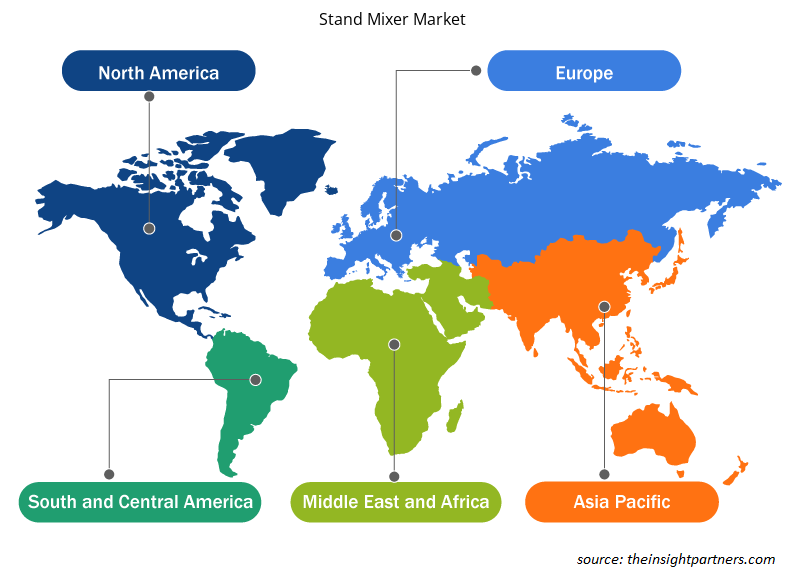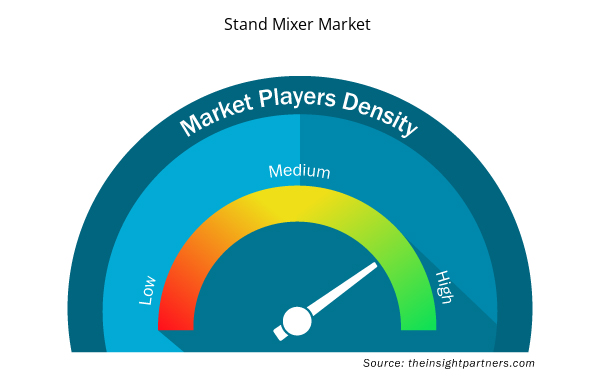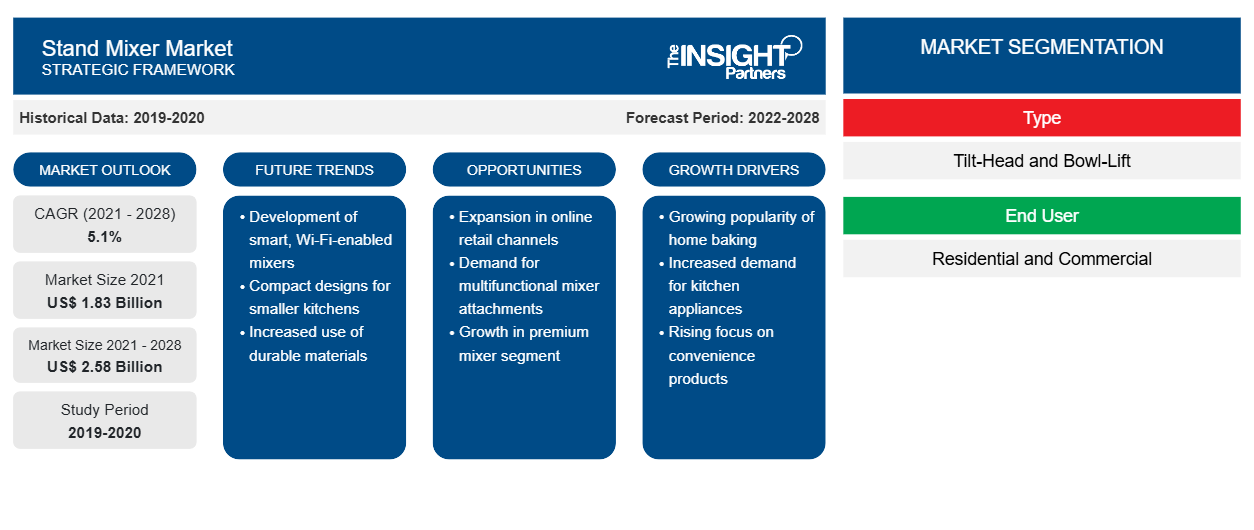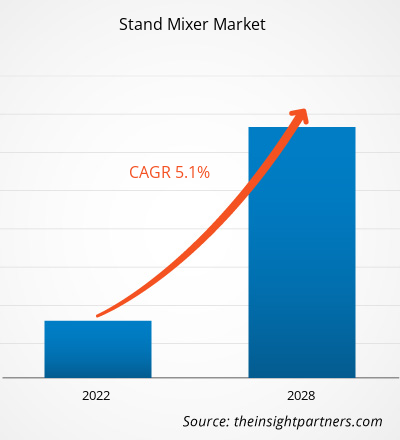El mercado de batidoras de pie se valoró en US$ 1.826,01 millones en 2021 y se proyecta que alcance los US$ 2.581,23 millones en 2028; se espera que crezca a una CAGR del 5,1% entre 2021 y 2028.
Una batidora de pie es una batidora estacionaria con un motor adecuado para tareas de mezclado de medianas a pesadas. La mayoría de las batidoras de pie disponibles en el mercado vienen con accesorios estándar para mezclar, batir y amasar. Hay muchas marcas disponibles en el mercado que ofrecen batidoras con diferentes características.
En 2020, Europa tuvo la mayor participación en los ingresos del mercado mundial de batidoras de pie . Europa es un mercado lucrativo para las batidoras de pie debido al rápido crecimiento de la industria de alimentos procesados debido al mayor consumo de productos alimenticios como productos horneados, productos lácteos y bocadillos. Además, los actores del mercado que operan en la región están adoptando diversas estrategias, como la innovación y el lanzamiento de nuevos productos. Esto impulsará aún más el crecimiento del mercado en Europa.
Personalice este informe según sus necesidades
Obtendrá personalización en cualquier informe, sin cargo, incluidas partes de este informe o análisis a nivel de país, paquete de datos de Excel, así como también grandes ofertas y descuentos para empresas emergentes y universidades.
- Obtenga las principales tendencias clave del mercado de este informe.Esta muestra GRATUITA incluirá análisis de datos, desde tendencias del mercado hasta estimaciones y pronósticos.
Impacto de la pandemia de COVID-19 en el mercado de batidoras de pie
La actual pandemia de COVID-19 ha alterado drásticamente el estado del sector de bienes de consumo y ha afectado negativamente al crecimiento del mercado de batidoras de pie. La implementación de medidas para combatir la propagación del virus ha agravado la situación. La pandemia ha causado una perturbación sin precedentes en el mercado global. Sin embargo, muchas personas se quedaron en casa y cocinaron por sí mismas. Por lo tanto, el mercado de batidoras de pie se vio ligeramente impulsado por la pandemia. Además, a medida que los países reabren sus economías, se espera que la demanda de batidoras de pie aumente aún más a nivel mundial en los próximos meses.
Perspectivas del mercado
Crecimiento de la industria de alimentos procesados
En muchas economías del mundo, el consumo de bebidas, productos de panadería y dulces está en aumento. Además, el mercado de alimentos procesados está creciendo rápidamente debido al aumento de la población y del poder adquisitivo de los consumidores en muchas economías en desarrollo. Por lo tanto, la creciente industria de alimentos procesados está impulsando el crecimiento del mercado de batidoras de pedestal.
Tipo de información
Según el tipo, el mercado mundial de batidoras de pie se divide en batidoras con cabezal inclinable y batidoras con elevación de tazón. El segmento de batidoras con cabezal inclinable tuvo una mayor participación en el mercado en 2020. El cabezal inclinable de las batidoras con cabezal inclinable facilita la extracción y la adición rápida de nuevos accesorios. Dado que hay un gran espacio entre el tazón y el accesorio para mezclar, es fácil agregar ingredientes y raspar el tazón. Por lo tanto, varias ventajas de las batidoras de pie con cabezal inclinable impulsan su demanda.
Entre los actores clave que operan en el mercado global de batidoras de pedestal se encuentran De' Longhi Appliances Srl; The Whirlpool Corporation; Koninklijke Philips NV; Breville; SMEG SpA; Hobart; Ankarsrum Kitchen AB; Wonderchef Home Appliances Pvt. Ltd.; Kenwood Limited; Hamilton Beach Brands, Inc.; y Panasonic. Los actores que operan en el mercado están altamente enfocados en el desarrollo de ofertas de productos innovadores y de alta calidad para satisfacer los requisitos de los clientes.Longhi Appliances S.r.l.; The Whirlpool Corporation; Koninklijke Philips N.V.; Breville; SMEG S.p.A.; Hobart; Ankarsrum Kitchen AB; Wonderchef Home Appliances Pvt. Ltd.; Kenwood Limited; Hamilton Beach Brands, Inc.; and Panasonic are among the key players operating in the global stand mixer market. Players operating in the market are highly focused on the development of high-quality and innovative product offerings to fulfill the customer’s requirements.
Perspectivas regionales del mercado de batidoras de pie
Los analistas de Insight Partners explicaron en detalle las tendencias y los factores regionales que influyen en el mercado de batidoras de pie durante el período de pronóstico. Esta sección también analiza los segmentos y la geografía del mercado de batidoras de pie en América del Norte, Europa, Asia Pacífico, Oriente Medio y África, y América del Sur y Central.

- Obtenga datos regionales específicos para el mercado de batidoras de pie
Alcance del informe de mercado de batidoras de pie
| Atributo del informe | Detalles |
|---|---|
| Tamaño del mercado en 2021 | 1.830 millones de dólares estadounidenses |
| Tamaño del mercado en 2028 | US$ 2,58 mil millones |
| CAGR global (2021-2028) | 5,1% |
| Datos históricos | 2019-2020 |
| Período de pronóstico | 2022-2028 |
| Segmentos cubiertos | Por tipo
|
| Regiones y países cubiertos | América del norte
|
| Líderes del mercado y perfiles de empresas clave |
|
Densidad de actores del mercado de batidoras de pie: comprensión de su impacto en la dinámica empresarial
El mercado de batidoras de pedestal está creciendo rápidamente, impulsado por la creciente demanda de los usuarios finales debido a factores como la evolución de las preferencias de los consumidores, los avances tecnológicos y una mayor conciencia de los beneficios del producto. A medida que aumenta la demanda, las empresas amplían sus ofertas, innovan para satisfacer las necesidades de los consumidores y aprovechan las tendencias emergentes, lo que impulsa aún más el crecimiento del mercado.
La densidad de actores del mercado se refiere a la distribución de las empresas o firmas que operan dentro de un mercado o industria en particular. Indica cuántos competidores (actores del mercado) están presentes en un espacio de mercado determinado en relación con su tamaño o valor total de mercado.
Las principales empresas que operan en el mercado de batidoras de pie son:
- Delaware
Descargo de responsabilidad : Las empresas enumeradas anteriormente no están clasificadas en ningún orden particular.

- Obtenga una descripción general de los principales actores clave del mercado de batidoras de pie
Informe Destacado
- Tendencias progresivas de la industria en el mercado de batidoras de pie para ayudar a los actores a desarrollar estrategias efectivas a largo plazo
- Estrategias de crecimiento empresarial adoptadas por los mercados desarrollados y en desarrollo
- Análisis cuantitativo del mercado de batidoras de pie de 2019 a 2028
- Estimación de la demanda mundial de batidoras de pedestal
- Avances recientes para comprender el escenario competitivo del mercado
- Tendencias y perspectivas del mercado, así como factores que impulsan y restringen el crecimiento del mercado de batidoras de pie
- Asistencia en el proceso de toma de decisiones destacando las estrategias de mercado que sustentan el interés comercial y conducen al crecimiento del mercado.
- El tamaño del mercado de batidoras de pie en varios nodos
- Descripción detallada y segmentación del mercado, así como la dinámica de la industria de las batidoras de pie.
- Tamaño del mercado de batidoras de pie en varias regiones con oportunidades de crecimiento prometedoras
Mercado mundial de batidoras de pedestal
Tipo
- Cabeza inclinada
- Elevador de cuencos
Usuario final
- Residencial
- Comercial
Canal de distribución
- Supermercados e Hipermercados
- Tiendas especializadas
- Venta minorista en línea
- Otros
Perfiles de empresas
- Electrodomésticos De' Longhi Srl
- La corporación Whirlpool
- Philips NV, la línea Koninklijke
- Breville
- Smeg SpA
- Hobart
- Cocina Ankarsrum AB
- Electrodomésticos Wonderchef Pvt. Ltd.
- Kenwood limitada
- Marcas de Hamilton Beach, Inc.
- Panasonic
- Análisis histórico (2 años), año base, pronóstico (7 años) con CAGR
- Análisis PEST y FODA
- Tamaño del mercado Valor/volumen: global, regional, nacional
- Industria y panorama competitivo
- Conjunto de datos de Excel



Report Coverage
Revenue forecast, Company Analysis, Industry landscape, Growth factors, and Trends

Segment Covered
This text is related
to segments covered.

Regional Scope
North America, Europe, Asia Pacific, Middle East & Africa, South & Central America

Country Scope
This text is related
to country scope.
Preguntas frecuentes
Growth in food & beverage blending and mixing is the key opportunity for the global stand mixer market. The major players' technological innovations in this market offer faster mixing & blending and high precision and hygiene. Owing to the increasing demand for various food & beverage products, manufacturers in these industries are looking forward to equipping state-of-the-art production facilities with automated machinery and systems.
Based on end user, the residential segment led the global stand mixer market in 2020. Growth of the residential sector supported by positive government measures is expected to promote the demand for stand mixer in the global market scenario. With the surge in population, significant growth in the real estate and residential sector has been witnessed. Also, these days people are trying to recreate their favourite baking recipes at home. From savoury delicacies to sweet treats all across the globe, people are pushing their cooking skills to their optimum levels. Stand mixers are aimed at keen baking enthusiasts and home bakers.
The development of many new commercial establishments such as hotels, cafes, and restaurants are anticipated to propel market growth. They require numerous appliances like stand mixers to perform their daily operations efficiently. This emergence of new commercial establishments is leading to an upsurge in the purchase of stand mixers. As such establishments require continuous cooking operations that need to be quick, they use stand mixers and other appliances to increase operational efficiencies and lessen waiting time.
Based on type, the tilt-head segment led the global stand mixer market in 2020. These mixers have a switch that allows tilting the mixer’s head back to add ingredients. The tilt-head mixers have a lever on the side that allows to unlock the head and tilt it up and back, giving access to the mixing bowl. Also, these are the most convenient for home use as they’re compact and easy to use while still providing the power to handle all baking as well as mixing tasks.
The major players operating in the global stand mixer market are De’Longhi Appliances S.r.l.; The Whirlpool Corporation; Koninklijke Philips N.V.; Breville; SMEG S.p.A.; Hobart; Ankarsrum Kitchen AB; Wonderchef Home Appliances Pvt. Ltd.; Kenwood Limited; and Hamilton Beach Brands, Inc.
During the forecast period, Europe is anticipated to account for the largest share of the global stand mixer market. Europe region comprises several developed and developing economies, including China, India, Japan, South Korea, among others. In Europe region, the demand for stand mixers is increasing with the growing population, high disposal income, the surge in interest in domestic baking and cooking, the advent of the new commercial establishment such as hotels, restaurants, and cafes, and the inclusion of new features and functionalities in stand mixers are bolstering the growth of the stand mixer market in this region.
Trends and growth analysis reports related to Consumer Goods : READ MORE..
The List of Companies - Stand Mixer Market
- De’Longhi Appliances S.r.l.
- The Whirlpool Corporation
- Koninklijke Philips N.V.
- Breville
- SMEG S.p.A.
- Hobart
- Ankarsrum Kitchen AB
- Wonderchef Home Appliances Pvt. Ltd.
- Kenwood Limited
- Hamilton Beach Brands, Inc.
The Insight Partners performs research in 4 major stages: Data Collection & Secondary Research, Primary Research, Data Analysis and Data Triangulation & Final Review.
- Data Collection and Secondary Research:
As a market research and consulting firm operating from a decade, we have published and advised several client across the globe. First step for any study will start with an assessment of currently available data and insights from existing reports. Further, historical and current market information is collected from Investor Presentations, Annual Reports, SEC Filings, etc., and other information related to company’s performance and market positioning are gathered from Paid Databases (Factiva, Hoovers, and Reuters) and various other publications available in public domain.
Several associations trade associates, technical forums, institutes, societies and organization are accessed to gain technical as well as market related insights through their publications such as research papers, blogs and press releases related to the studies are referred to get cues about the market. Further, white papers, journals, magazines, and other news articles published in last 3 years are scrutinized and analyzed to understand the current market trends.
- Primary Research:
The primarily interview analysis comprise of data obtained from industry participants interview and answers to survey questions gathered by in-house primary team.
For primary research, interviews are conducted with industry experts/CEOs/Marketing Managers/VPs/Subject Matter Experts from both demand and supply side to get a 360-degree view of the market. The primary team conducts several interviews based on the complexity of the markets to understand the various market trends and dynamics which makes research more credible and precise.
A typical research interview fulfils the following functions:
- Provides first-hand information on the market size, market trends, growth trends, competitive landscape, and outlook
- Validates and strengthens in-house secondary research findings
- Develops the analysis team’s expertise and market understanding
Primary research involves email interactions and telephone interviews for each market, category, segment, and sub-segment across geographies. The participants who typically take part in such a process include, but are not limited to:
- Industry participants: VPs, business development managers, market intelligence managers and national sales managers
- Outside experts: Valuation experts, research analysts and key opinion leaders specializing in the electronics and semiconductor industry.
Below is the breakup of our primary respondents by company, designation, and region:

Once we receive the confirmation from primary research sources or primary respondents, we finalize the base year market estimation and forecast the data as per the macroeconomic and microeconomic factors assessed during data collection.
- Data Analysis:
Once data is validated through both secondary as well as primary respondents, we finalize the market estimations by hypothesis formulation and factor analysis at regional and country level.
- Macro-Economic Factor Analysis:
We analyse macroeconomic indicators such the gross domestic product (GDP), increase in the demand for goods and services across industries, technological advancement, regional economic growth, governmental policies, the influence of COVID-19, PEST analysis, and other aspects. This analysis aids in setting benchmarks for various nations/regions and approximating market splits. Additionally, the general trend of the aforementioned components aid in determining the market's development possibilities.
- Country Level Data:
Various factors that are especially aligned to the country are taken into account to determine the market size for a certain area and country, including the presence of vendors, such as headquarters and offices, the country's GDP, demand patterns, and industry growth. To comprehend the market dynamics for the nation, a number of growth variables, inhibitors, application areas, and current market trends are researched. The aforementioned elements aid in determining the country's overall market's growth potential.
- Company Profile:
The “Table of Contents” is formulated by listing and analyzing more than 25 - 30 companies operating in the market ecosystem across geographies. However, we profile only 10 companies as a standard practice in our syndicate reports. These 10 companies comprise leading, emerging, and regional players. Nonetheless, our analysis is not restricted to the 10 listed companies, we also analyze other companies present in the market to develop a holistic view and understand the prevailing trends. The “Company Profiles” section in the report covers key facts, business description, products & services, financial information, SWOT analysis, and key developments. The financial information presented is extracted from the annual reports and official documents of the publicly listed companies. Upon collecting the information for the sections of respective companies, we verify them via various primary sources and then compile the data in respective company profiles. The company level information helps us in deriving the base number as well as in forecasting the market size.
- Developing Base Number:
Aggregation of sales statistics (2020-2022) and macro-economic factor, and other secondary and primary research insights are utilized to arrive at base number and related market shares for 2022. The data gaps are identified in this step and relevant market data is analyzed, collected from paid primary interviews or databases. On finalizing the base year market size, forecasts are developed on the basis of macro-economic, industry and market growth factors and company level analysis.
- Data Triangulation and Final Review:
The market findings and base year market size calculations are validated from supply as well as demand side. Demand side validations are based on macro-economic factor analysis and benchmarks for respective regions and countries. In case of supply side validations, revenues of major companies are estimated (in case not available) based on industry benchmark, approximate number of employees, product portfolio, and primary interviews revenues are gathered. Further revenue from target product/service segment is assessed to avoid overshooting of market statistics. In case of heavy deviations between supply and demand side values, all thes steps are repeated to achieve synchronization.
We follow an iterative model, wherein we share our research findings with Subject Matter Experts (SME’s) and Key Opinion Leaders (KOLs) until consensus view of the market is not formulated – this model negates any drastic deviation in the opinions of experts. Only validated and universally acceptable research findings are quoted in our reports.
We have important check points that we use to validate our research findings – which we call – data triangulation, where we validate the information, we generate from secondary sources with primary interviews and then we re-validate with our internal data bases and Subject matter experts. This comprehensive model enables us to deliver high quality, reliable data in shortest possible time.


 Obtenga una muestra gratuita de este informe
Obtenga una muestra gratuita de este informe